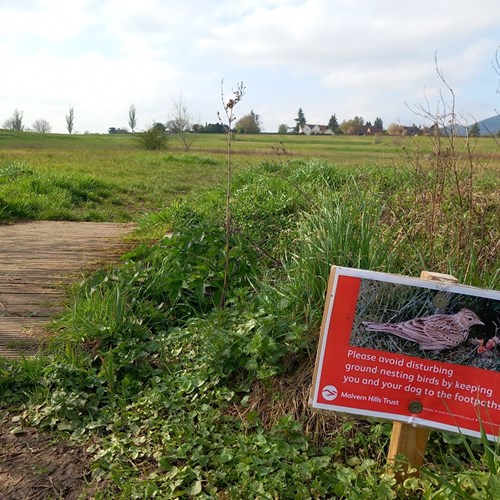Did you know that not all birds nest in trees?
Across the UK, the numbers of ground nesting birds are declining due to loss of habitat and disturbance by people and dogs.
During bird breeding season, from the 1st March to 31st July, you can help care for these special birds by keeping to the paths where you see the signs.
Small signs have been erected near to where ground-nesting birds are known to nest on Malvern Common, asking walkers to keep to paths in these areas or to take an alternative route to reduce levels of disturbance.
As the name suggests, ground-nesting birds, including meadow pipits and skylarks, make their nests and raise their young on the ground rather than in a tree or bush. This means that they are susceptible to disturbance by people and loose dogs.
Beck Baker, Community and Conservation Officer for the Trust said ‘It is especially important that dog walkers keep their dogs to the paths, close to heel or on a short lead in these areas to help protect our local wildlife.’
‘Even if your dog means no harm to the birds, the adult birds will see the dog as a threat and could abandon its nest. If the adults are away for too long, the eggs or chicks may get too cold and die.’
We are continuing our ongoing conservation work to clear scrub and trees from the upper slopes of the Hills during the winter, followed by sheep and cattle grazing, to restore the open grassland habitat. This is essential for encouraging the breeding of these birds that avoid nesting within 200 metres of a tree.
Beck added ‘We’ve seen a decrease in the number of ground-nesting birds on the Hills and Commons but by working together we can provide the best environment possible for this year’s breeding season.’
According to the RSPB, skylark numbers in the UK have halved since the 1990s and continue to decline. They are now a red listed species in the UK due to these dramatic population declines. Meadow pipit numbers have also declined since the 1990's and are an amber listed species.

